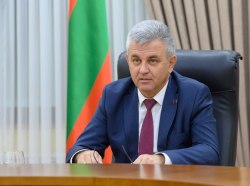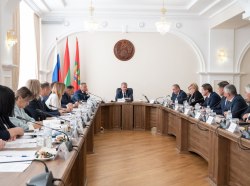Tiraspol, 8 April. /Novosti Pridnestrovya/. The government of the PMR has developed a number of measures aimed at minimising negative consequences for the country's economic entities, caused by the difficult situation in the foreign exchange market. Such information was voiced today during a meeting of the government's praesidium.
This includes the reduction of import duties and excises for some food and non-food products. In this way additional expanses of some enterprises which in order to pay the importation certain goods to Pridnestrovie, had to purchase overvalued foreign currency in the black market rather than at the official value from licensed banks, which often have no currency for sale.
According to the minister of economic development, Dmitry Boltrushko, the reduction of excises will help keep prices down for some categories of imported goods.
Two draft decrees by the government and two presidential decrees were submitted to the praesidium for consideration. The draft decrees provide for a 10% reduction in excise duty rates for petrol and diesel fuel. Thus, in case they are signed into laws by the head of state, the excise duty rate for petrol will be reduced from $210 to $189 per tonne, and the excise duty for diesel fuel will be cut from $100 to $90.
«It is expected that the reduction of excise duty rates will not entail a considerable drop in budget revenues in connection with the projected increase in the volume of import of such goods," noted Dmitry Boltrushko. The minister explained that the reduction of excise duty rate will decrease the final prices for fuel, hence increase in demand. So, according to estimates provided by Pridnestrovie's biggest fuel importer, this must encourage truck drivers who are going through the PMR's territory to fuel up in Pridnestrovie rather than in Moldova and Ukraine.
«We all understand that the sowing campaign is under way now, and I think this [reduction in fuel prices] will be of some, though little, help for them," added the prime minister, Pavel Prokudin.
The government's draft projects provide for the reduction of both preventive and special import duties for some meat, milk, fish, wheat and other products. In case they are approved, special import duties, which were introduced to equalise the competitive ability of domestic and imported goods, will be reduced twofold. «Speaking in terms of figures, the customs duty rate for one category of milk products is 30%, or $0.30 per kg, and we are reducing it to 5%, or $0.15," Dmitry Boltrushko cited an example.
Preventive duties are supposed to be reduced by a factor of five, which the minister believes will transform «the preventive mechanism into equalising», in other words, they will have the same functions as special duties.
Dmitry Boltrushko recalled that preventive and special duties had been introduced to increase the competitive capacity of domestic manufacturers; however, now they are receiving other forms of state assistance. Thus, they enjoy reduced power and gas supply tariff ceilings. At the same time, Dmitry Boltrushko added that domestic enterprises cannot fully meet the population's requirements on most positions, which means that the country has to import goods from abroad anyway, but special and preventive duties considerably raise their prices.
The reduction of excises and duties is seen as a temporary measure, until 1 June, after which the government will analyse economic implications this decision has brought about and see if the reduction of duties has resulted in reduced prices for import goods.
At the same time, according to Dmitry Boltrushko, at present the government has no sufficient mechanisms of determining the exact amount of marks-on. The Price and Antimonopoly Committee have the right to conduct such monitoring only on the limited category of goods. «In this regard, the anti-crisis programme provides for the expansion of the list of socially important goods whose pricing could be controlled by the government, and, we believe, if all these measures are adopted, the reduction of import duties may have a positive effect," concluded the minister of economic development.








